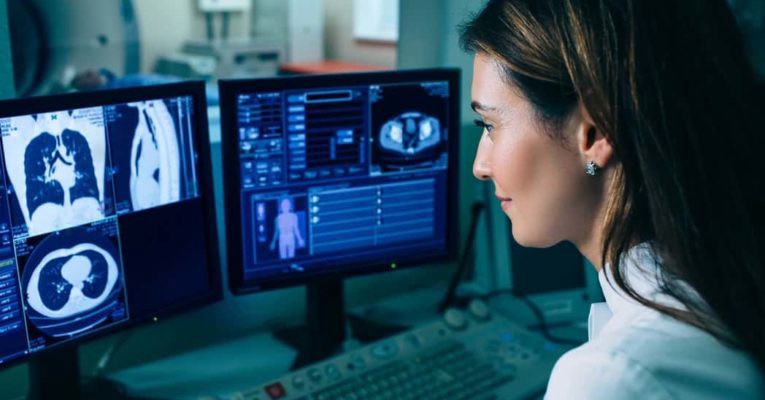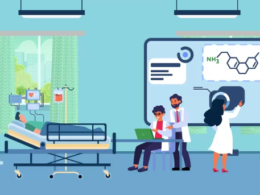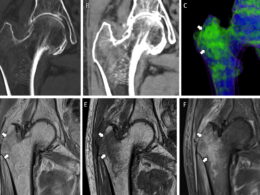This is a republication of the article below, followed by the abstract of the original paper.
Edited by
Joaquim Cardoso MSc.
Health Transformation Institute
AI Health Transformation Unit
July 6, 2022
Radiologists can reclaim an hour every day with AI assistance
Health Imaging
Hannah Murphy
June 13, 2022
Radiologists can reclaim up to an hour of their time every day by incorporating the use of artificial intelligence into certain clinical tasks.
That’s according to a release published by the American Roentgen Ray Society that touts the results of their study involving the workflows of 390 patients who underwent outpatient chest CT scans at the Medical University of South Carolina from January 19–28 of 2021.
Using commercial software (AI-Rad Companion) as an assistive device, three cardiothoracic radiologists shaved an average of 93 seconds per exam off of their interpretation times.
“This is the first study to our knowledge to assess the impact of an AI support platform on chest CT interpretation times in a real-world clinical setting,” corresponding author U. Joseph Schoepf, from the Medical University of South Carolina said.
“The platform’s integration into clinical workflow resulted in a mean reduction in interpretation times of 22.1% among three cardiothoracic radiologists for whom the AI results were made available.”
“The platform’s integration into clinical workflow resulted in a mean reduction in interpretation times of 22.1% among three cardiothoracic radiologists for whom the AI results were made available.”
ARRS indicates that the AI software assisted in various tasks, such as segmenting, labeling and measuring normal structures, which provided an automated analysis of pulmonary, cardiac and musculoskeletal findings.
In addition to this, the software was able to detect, label and measure abnormalities.
ARRS indicates that the AI software assisted in various tasks, such as segmenting, labeling and measuring normal structures, which provided an automated analysis of pulmonary, cardiac and musculoskeletal findings.
In addition to this, the software was able to detect, label and measure abnormalities.
Researchers compared interpretation times both with and without the use of AI assistance using a stopwatch.
Reductions in read times were between 63 and 123 seconds per exam, or 22.1% per exam.
These time differences were found to be consistent in studies regardless of the use of contrast as well, with interpretations taking 20% and 24.2% less time for contrast-enhanced and non-contrast scans.
“If assistance from automated AI results can save one hour of interpretation time each day as estimated from our results,” the authors of the study shared, “then radiologists could devote this time to other activities, whether additional clinical tasks such as communicating findings to patients and referring physicians, or administrative, education, and research responsibilities.”
“If assistance from automated AI results can save one hour of interpretation time each day as estimated from our results,” the authors of the study shared, “then radiologists could devote this time to other activities …
Originally published at https://www.healthimaging.com
Names mentioned
U. Joseph Schoepf, from the Medical University of South Carolina
ORIGINAL PUBLICATION (excerpt)

Impact of Artificial Intelligence Assistance on Chest CT Interpretation Times: A Prospective Randomized Study
AJR — American Journal of Roentgenology
Basel Yacoub, MDa,b, Akos Varga-Szemes, MD, PhDa, U. Joseph Schoepf, MDa, Ismail M. Kabakus, MD, PhDa, Dhiraj Baruah, MDa, Jeremy R. Burt, MDa, Gilberto J. Aquino, MDa, Allison K. Sullivan, BSa, Jim O’ Doherty, PhDc, Philipp Hoelzer, PhDd, Jonathan Sperl, PhDe and Tilman Emrich, MDa,f,g
June 8, 2022
ABSTRACT
Background:
- Deep learning-based convolutional neural networks have enabled major advances in development of artificial intelligence (AI) software applications.
- Modern AI applications offer comprehensive multiorgan evaluation.
Objective:
- To evaluate the impact of an automated AI platform, integrated into clinical workflow for chest CT interpretation, on radiologists’ interpretation times when evaluated in a real-world clinical setting.
Methods:
- In this prospective single-center study, a commercial AI software solution was integrated into clinical workflow for chest CT interpretation.
- The software provided automated analysis of cardiac, pulmonary, and musculoskeletal findings, including labeling, segmenting, and measuring normal structures as well as detecting, labeling, and measuring abnormalities.
- AI-annotated images and autogenerated summary results were stored in the PACS and available to interpreting radiologists.
- A total of 390 patients (204 female, 186 male; mean age, 62.8±13.3 years) who underwent outpatient chest CT between January 19, 2021 and January 28, 2021 were included.
- Scans were randomized using 1:1 allocation between AI-assisted and non-AI arms and were clinically interpreted by one of three cardiothoracic radiologists (65 scans per arm per radiologist; total of 190 scans per arm), who recorded interpretation times using a stopwatch.
- Findings were categorized based on review of report impressions.
- Interpretation times were compared between arms.
Results:
- Mean interpretation times were significantly shorter in the AI-assisted than in the non-AI arm for all three readers (289±89 vs 344±129 seconds, p<.001; 449±110 vs 649±82 seconds, p<.001; 281±114 vs 348±93 seconds, p=.01)
and for readers combined (328±122 vs 421±175 seconds, p<.001). - For readers combined, the mean difference was 93 seconds (95% CI, 63–123 seconds), corresponding with a 22.1% reduction in the AI-assisted arm.
- Mean interpretation time was also shorter in the AI-assisted arm compared with the non-AI arm for contrast-enhanced scans (83 seconds),
non-contrast scans (104 seconds),
negative scans (84 seconds),
positive scans without significant new findings (117 seconds),
and positive scans with significant new findings (92 seconds).
Conclusion:
- Cardiothoracic radiologists exhibited a 22.1% reduction in chest CT interpretations times when having access to results from an automated AI support platform during real-world clinical practice.
Clinical Impact:
- Integration of the AI support platform into clinical workflow improved radiologist efficiency.
Selected images

About authors and affiliations
Basel Yacoub, MD a, b; Akos Varga-Szemes, MD, PhD a; U. Joseph Schoepf a, MD;Ismail M. Kabakus, MD, PhD a; Dhiraj Baruah, MD a; Jeremy R. Burt, MD a; Gilberto J. Aquino, MD a; Allison K. Sullivan, BS a; Jim O’ Doherty, PhD c; Philipp Hoelzer, PhD d; Jonathan Sperl, PhD e; Tilman Emrich, MD a, f, g
a Division of Cardiovascular Imaging, Department of Radiology and Radiological Science,
Medical University of South Carolina, Charleston, SC, USA
b Department of Radiology,
Texas Tech University Health Sciences Center El Paso, El Paso, TX, USA
c Siemens Medical Solutions USA, Malvern, PA, USA
d Siemens Healthineers, Princeton, NJ, USA
e Siemens Healthineers, Erlangen, Germany
f Department of Diagnostic and Interventional Radiology,
University Medical Center Mainz, Langenbeckstr. 1, 55131 Mainz, Germany
g German Center for Cardiovascular Research (DZHK),
Partner-Site Rhine-Main, Langenbeckstr. 1, 55131 Mainz, Germany
Originally published at https://www.ajronline.org












